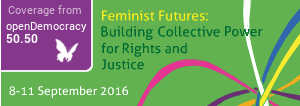What's justice for migrant women workers?
Those who want to help migrant women access justice must listen to them, and their concerns and priorities.
What's justice for migrant women workers?
Those who want to help migrant women access justice must listen to them, and their concerns and priorities.
Women and the 'Arab Spring'
Women and the Economy
Women's Movement Building
debates and strategies
Voices for change in the UK
Gender in the Albanosphere
- 1 of 77
- ››

.jpg)










































.jpg)